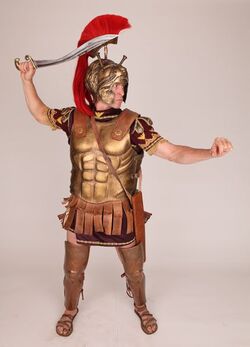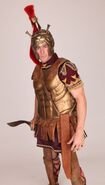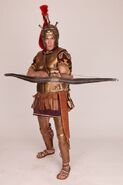(→Trivia) |
|||
| Line 79: | Line 79: | ||
*One of the many reasons why Alexander's soldiers threatened mutiny at the Hyphasis River was because their clothing was beginning to rot off since they worn it for 8 years. |
*One of the many reasons why Alexander's soldiers threatened mutiny at the Hyphasis River was because their clothing was beginning to rot off since they worn it for 8 years. |
||
*The reason why Alexander never declared a clear heir to his throne was because he feared that the heir would overthrow him or launch a civil war. |
*The reason why Alexander never declared a clear heir to his throne was because he feared that the heir would overthrow him or launch a civil war. |
||
| + | *The conquests of Alexander inspired the conquests of Chandragupta Maurya to form the Maurya Empire (322 BCE–187 BCE). |
||
Revision as of 11:34, 28 May 2018
| Alexander the Great | |
|---|---|

| |
| Weapons | Kopis, Xyston, Gastraphetes, Ballista |
| Origin | Macedonia, Ancient Greece |
| Activities | Brilliant General |
| Service | 336-323 BC |
| Battle Status | Lost against Attila the Hun |
| Experts | Peter van Rossum (Sword and Shield Champion) Kendall Wells (Bladed Weapon Specialist) |
"Alexander wanted to be the greatest conqueror the world had ever seen."- Peter van Rossum.
"I'm not afraid of an army of lions lead by sheep. I'm afraid of an army of sheep led by a lion." Alexander the Great Alexander The Great, the warrior king, whose brutal tactics carved out one of the largest empires in history;
vs. Attila the Hun, the notorious barbarian horseman, who terrorized and ravaged the European Continent.
Stats
- 340 - 323 BC
- Height -5' 7"
- Weight - 155 lbs
- Armor - Bronze Cuirass
History
Much of Alexander's Empire and military experience originated from his father Philip II. Philip introduced many revolutionary military strategies and tactics and studied Thebian tactics that Alexander would later adapt. Since Philip once lived in Thebes, he was able to unite the Greek citystate by conquering it with his knowledge of their military. It also helped that many of the Greek city states after many years of being at war with each other were had exhausted themselves and so some city-states were militarily and politically frail at this time.
Alexander III of Macedon (21 July 356 BC- 10 June 323 BC), better known as Alexander the Great was born to Philip II of Macedonia. Tutored by the famous Greek philosopher Aristotle.
Alexander grew up in his father's military; leading the Macedonian Calvary. One example of his generalship during this time was the Battle of Chaeronea, where Alexander outflanked the Thebians.
Alexander succeeded his father following Philip's assassination (by Philip's own bodyguard Pausanias of Orestis in 336BC), when Alexander was only 21 years old. Alexander immediately faced revolts due to the power vacuum from Philip's death; but Alexander paraded his army across Greece to intimidate the rebels into submission.
The Persian Empire at this time was facing political infighting, instability and revolts. Alexander declared war on Persia, justifying the invasion by claiming it was for revenge for the Greco-Persian Wars centuries ago.
During the next 13 years, Alexander was undefeated in battle and created the largest empire the world had seen up until that time. It incorporated most of Egypt, the former Persian Empire, and reached to the western most parts of India. Had his soldiers not revolted at this point, Alexander may have continued expanding his empire eastward.
Alexander was well-known for being a brilliant strategist. When confronted with scythed chariots, Alexander, realizing that the vehicles were already cumbersome, devised a method to increase this disadvantage. At the last second, his soldiers formed a U-shape so that the chariots would become trapped by the bodies of the soldiers they killed, leaving the charioteers at the mercy of the Macedonian Xystons.
Another story showcasing Alexander's intellect is that of the Gordian Knot. According to legend, the knot could only be untied by the future ruler of Asia. Hearing of the legend, Alexander traveled to Gordium to attempt it. Unable to find the end of the knot to unbind it, Alexander claimed it did not matter how the knot was undone and cut through it with his sword, producing the required ends.
After conquering modern day Pakistan his soldiers refused to continue his conquests: threatening to mutiny at the Hyphasis River (currently named the Beas River). Alexander's Macedonian Empire, which although short lived, was the largest Empire up to that point in history. However Alexander's lust for conquest put him into a deep depression during peacetime. Before he died his successors demanded to know who would rule the Empire after his death. Alexander's last words replied to this question, he said "To the strongest".
After his death the Macedonian Empire became engulfed in civil war (The Wars of the Diadochi lasting 322–275 BC) and fragmented into 4 major kingdoms. Two noticeable successor states were the Selucid Empire (effectively the new Persian Empire) and the Egyptian Ptolemaic Kingdom (the last dynasty of Egypt before Cleopatra VII's death in 30 BC, where it would be absorbed into the Roman Empire).
Macedonia eventually shrunk back to command only the Balkans and Greece during the period known as the Hellenistic. The Roman Empire would invade Macedonia between 214-148 BC and continue onward to the rest of Greece until 31 BC: adding the territories to its Empire. But the Eastern and Western halves of the Roman Empire split in 330 AD and would later be known as the Byzantine Empire.
Weapons
- Short Range: Kopis = 120
- Mid Range: Xyston = 225
- Long Range: Gastraphetes = 52
- Special: Ballista = 7
- Armor: Bronze cuirass, Chalcidian helmet, bronze shield.
- Total Kills = 404
Rashad Evans also demonstrated the ancient Greek martial art Pankration, which Alexander used during his battle with Attila, though it was not listed as one of his official weapons nor did it receive any kills in the simulation.
Deadlist Warrior Legends Weapons
- Short Range: Kopis, Makhaira
- Medium Range: Xyston, Sarissa
- Long Range: Gastraphetes, Javelin
- Armor: Bronze Cuirass, Linothorax
- Joke Weapon: Umbrella
- Final Strike: Stabs opponent, then twists the sword upwards before pulling it out.
Battle
The battle opens with two of Alexander the Great's soldiers pushing the Ballista toward a city pillaged by Attila and his men. They slowly turn the crank on the Ballista to pull back the band. Inside the city, Attila the Hun is sitting down and having lunch while his men are examining their weapons. They see a flock of birds suddenly take off and realize that something is up ahead. The Macedonian soldier loads the bolt onto the band and, upon Alexander's command, fires it toward Attila's men. One of Attila's men stands up to see what was going on, and is consequently hit with the bolt. Attila gets up and sees Alexander and his men rushing at them, with Alexander on a horse. Attila jumps onto his horse and takes the bow and arrow handed to him by his fellow warrior. The Hun then takes his own bow and arrow and charges at the oncoming soldiers. One of Alexander's men tries to set up his Gastraphetes bow, but is shot by the Hun's arrow. Attila draws his bow and tries to shoot Alexander, but the arrow bounces off his armor. The Hun also tries to shoot Alexander, but Alexander rides in with the Xyston and thrusts it through the Hun, killing him. Attila and his horse run toward Alexander, and Attila attempts to get his lasso around Alexander's neck. This backfires when Alexander grabs the rope and pulls Attila from his horse. Attila yanks on the rope in retaliation and pulls Alexander off his horse as well. Alexander grabs a shield from one of his fallen comrades and draws his Kopis while Attila grabs another shield and pulls out his Scythian Axe. The two begin fighting, and Alexander knocks the shield out of Attila's hands. He attempts to slice Attila, but misses. Attila swings the axe and lodges it into Alexander's shield, pulling on it and removing it from Alexander's hands. Attila then draws his Sword of Mars and the two warriors begin to clash swords. Attila manages to hit Alexander's arm, but as he goes in for the kill, Alexander drops his sword, flips him over, and knocks him into the wall, causing him to lose the Sword of Mars. The two start fighting with their bare hands, until Alexander throws Attila onto the floor. Attila spots his sword on the floor and scrambles to retreive his sword. Alexander grabs Attila's leg and tries to pull him away from the sword, but Attila kicks Alexander in the face. He tries once again to grab his sword and succeeds. Alexander approaches Attila and is promptly stabbed through the neck. Attila thrusts his sword in the air and yells in victory.
NOTE: One of Alexander's men was not seen to be killed during the simulation, but was shown to have died.
Trivia
- Alexander's titles included; Basileus (King) of Macedon, Hegemon of the Hellenic League, Lord of Asia, Pharaoh of Egypt and Shahanshah (King) of Persia.
- Roman Emperor Caligula, famous for his insanity, was rumored to have graverobbed from Alexander the Great's tomb and wore his bronze breastplate.
- Alexander's chestplate had an image of Medusa, as although she was a demon she was also considered a guardian in Greek culture. Many Spartan shields were decorated with a Medusa head.
- Alexander ordered his men to shave so that long beards could not be grabbed during battle. This probably influenced western culture as people of the western world typically shave.
- Alexander renamed or founded at least 18 major cities or towns, naming them Alexandria (or a variation of this word).
- Alexander named the city Alexandria Bucephalous after his horse Bucephalus; who was rumored to be decedent of the Mares of Diomedes which Hercules famously fought against. Alexander's taming of the horse was considered a legendary feat as the horse was violently hostile to anyone else.
- Many historians theorized that Alexander may have been bisexual, which wasn't considered taboo in Greek culture.
- Egypt declared Alexander a Pharaoh after he conquered the nation. Egyptians loved Alexander as he did not attempt to influence or change Egyptian culture or religion: a trait rarely found in any other imperialist emperor.
- While not entirely confirmed; it is believed that the Kalash people of Pakistan are decedents of Alexander the Great and his army. The Taliban have persecuted and attacked this minority group frequently.
- It is believed that Alexander retreated from India through the deserts of the Middle East intentionally to punish his soldiers for their attempted mutiny. Alexander could have easily returned home by a sea route, which would have been faster and safer.
- Greeks and Macedonians still to this day debate over if Alexander was Greek or Macedonian. This debate over if Macedonians classify as Greeks existed even before Alexander's birth; Greeks considered the Macedonians to be too far north to be classified as Greeks.
- Alexander the Great considered invading Africa, but did not have the time, resources or support to attempt such a campaign before his death.
- Many Macedonians and Greeks hated Alexander's imperial expansion as they feared that Alexander was turning into a tyrannical dictator due to his growing power.
- One of the many reasons why Alexander's soldiers threatened mutiny at the Hyphasis River was because their clothing was beginning to rot off since they worn it for 8 years.
- The reason why Alexander never declared a clear heir to his throne was because he feared that the heir would overthrow him or launch a civil war.
- The conquests of Alexander inspired the conquests of Chandragupta Maurya to form the Maurya Empire (322 BCE–187 BCE).
- Stock footage from "Ultimate Battles- Alexander the Great" was used in the episode.
- Alexander the Great was portrayed by Jason Faunt in the simulation, who already acted out the role of the Macedonian king in a 2006 film about the Greek conqueror.



